2015 Annual Merit Review Awards
Each year, at the Annual Merit Review and Peer Evaluation Meeting, the Hydrogen and Fuel Cells Program presents awards for contributions to the overall efforts of the Program and to recognize achievements in specific areas.
Hydrogen and Fuel Cells Program Awards
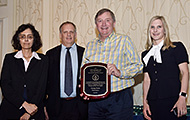
L to R: Sunita Satyapal, Fuel Cell Technologies Office (FCTO); Ned Stetson, FCTO; George Parks, FuelScience LLC; Erika Sutherland, FCTO
George Parks, FuelScience LLC
This award recognizes George Parks of FuelScience LLC (formerly with ConocoPhillips and Phillips 66) for his outstanding dedication and contributions to advancing hydrogen technologies and the U.S. Department of Energy's Hydrogen Program. George has served on two of the U.S. DRIVE Partnership's Technical Teams—Hydrogen Storage and Hydrogen Delivery—since the energy partners were added to the partnership in 2003. He has been a consistent liaison between the two Technical Teams and brings deep technical understanding and practical experience to techno-economic analyses that ensure the feasibility of using technologies in practical applications. George's broad base of experience in technical chemistry, large-scale fuel production, and engineering and retail environments has helped guide the assessment of potential hydrogen storage materials and systems for onboard and off-board vehicle requirements as well as the technical assessment of hydrogen delivery technologies. George's expertise has been especially helpful in evaluating the production and regeneration feasibilities of potential hydrogen storage materials when considering impacts on fueling stations and the delivery infrastructure. In addition, his continued service as a technical advisor to the DOE Hydrogen Program, providing valuable insight and candid feedback on DOE program plans, project reviews, and other strategic and technical products, is highly valued.
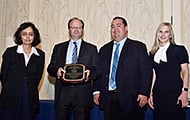
L to R: Sunita Satyapal, FCTO; Jesse Schneider, BMW of North America; Will James, FCTO; Erika Sutherland, FCTO.
Jesse Schneider, BMW of North America
This award recognizes Jesse Schneider of BMW for his outstanding dedication and contributions to the global hydrogen refueling community and the U.S. Department of Energy's Hydrogen Program. As the Chair of the working group for SAE J2601—the Worldwide Hydrogen Fueling Protocol—Jesse played a major role in the successful release of this new hydrogen fueling standard, which will provide essential support for the emerging fuel cell electric vehicle (FCEV) infrastructure. He has contributed to a number of important national and international collaborative efforts, including the development of SAE standards for hydrogen vehicle-to-station communications hardware and software (SAE J2799), establishing emergency response procedures for FCEVs, and developing a hydrogen dispenser test device and hydrogen quality specification at the California Fuel Cell Partnership. He also has provided valuable insights to the DOE Hydrogen and Fuel Cells Program through his participation in several of the U.S. DRIVE Partnership's Technical Teams. Jesse is currently the Manager of Fuel Cell Electric Vehicle Development and Standards at BMW of North America. He recently relocated from the Munich office of BMW, where he was the project manager in charge of the 70 MPa hydrogen storage effort, as well as the standardization activities for FCEVs.
Hydrogen Production
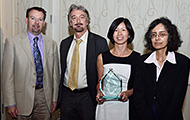
L to R: Keith Wipke, NREL; Eric Miller, FCTO; Huyen Dinh, NREL (accepting for Pin-Ching Maness); Sunita Satyapal, FCTO.
Pin-Ching Maness, National Renewable Energy Laboratory
This award recognizes Ms. Pin-Ching Maness of the National Renewable Energy Laboratory (NREL) for her outstanding achievements in biological hydrogen production. Pin-Ching is the Principal Group Manager of the Photobiology Group at NREL, where she has been working for nearly 35 years. During her time at NREL she has contributed to research addressing nearly every type of biological hydrogen production pathway, from microbial water-gas shift reactions in photosynthetic bacteria to fermentation of corn stover. In her recent work with the Fuel Cell Technologies Office, she developed molecular biology tools that allow the genetic modification of the bacterium Clostridium thermocellum, making NREL one of the few labs capable of genetically manipulating this promising strain, and demonstrated the ability of the strain to produce hydrogen from renewable lignocellulosic biomass resources. In addition to her research activities, she has also contributed her technical expertise to the field in other ways, such as assisting in developing techno-economic analysis models for biological hydrogen production pathways, and organizing the Biological Hydrogen Production Workshop.
Hydrogen Storage
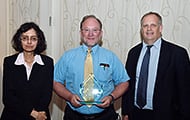
L to R: Sunita Satyapal, FCTO; Robert Bowman, ORNL; Ned Stetson, FCTO.
Robert Bowman, Oak Ridge National Laboratory
This award recognizes Dr. Robert (Bob) Bowman of Oak Ridge National Laboratory for his outstanding dedication and achievements in hydrogen storage material research and development. Bob has devoted his career to the advancement of hydrogen storage technologies that are focused on metal hydrides. His list of achievements includes more than 250 scientific and technical publications in the field and the design and development of a metal hydride cryo-cooler that flew for four years aboard the European Space Agency's Planck mission, producing the most accurate maps of the cosmic microwave background to further the understanding of the evolution of the universe. He has also served as a technical advisor to the U.S. Department of Energy's Hydrogen Storage Team for the past six years, providing valuable insights and feedback on potential hydrogen storage materials and systems.
Fuel Cells
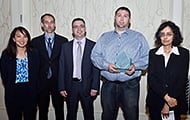
L to R: Donna Ho, FCTO; David Peterson, FCTO; Dimitrios Papageorgopoulos, FCTO; David Harvey, Ballard Power Systems; Sunita Satyapal, FCTO.
David Harvey, Ballard Power Systems
This award recognizes David Harvey of Ballard Power Systems for his outstanding contributions to the fuel cell research community and the development of an open-source fuel cell performance and durability model. A renowned expert on modeling pertaining to fuel cell performance and durability, David is the principal investigator for "Open-Source PEMFC-Performance and Durability Model Consideration of Membrane Properties on Cathode Degradation," a follow-on to the U.S. Department of Energy's Fuel Cell Technologies Office "Development of Micro-Structural Mitigation Strategies for PEM Fuel Cells: Morphological Simulations and Experimental Approaches" project. The resulting proton exchange membrane (PEM) fuel cell forward predictive model is called "FC-APOLLO" (Fuel Cell Application Package for Open-source Long-Life Operation). This project focused on understanding the effects of operating conditions, cathode catalyst layer structure and composition, and membrane properties on fuel cell degradation mechanisms. The model was validated with experimental data sets using state-of-the-art materials. This open-source model is a valuable tool for the fuel cell development community and David played an instrumental role in both its inception and release.
Safety, Codes and Standards
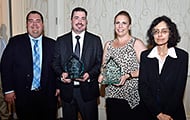
L to R: Will James, FCTO; Nick Barilo, PNNL; Jennifer Hamilton, CaFCP; Sunita Satyapal, FCTO.
Jennifer Hamilton, California Fuel Cell Partnership
This award recognizes Jennifer Hamilton, a Safety and Education Specialist at the California Fuel Cell Partnership (CaFCP), for outstanding contributions to hydrogen safety outreach activities and the development of hydrogen first responder training. She has been leading CaFCP's outreach and education to first responders and permitting officials since 2006. Through her work, Jennifer has reached thousands in California communities where hydrogen fuel cell vehicles and stations already exist, or will be coming. Most recently she, along with the Pacific Northwest National Laboratory, created the online National Hydrogen Safety Training Resource for Emergency Responders. Jennifer has a working relationship with the California Office of the State Fire Marshal, the U.S. Department of Energy, the National Fire Academy, and the National Fire Protection Association for implementing first responder education. Jennifer also actively participates in various safety, codes, and standards groups including SAE International, CSA Group, and ISO on efforts related to vehicle and fueling station safety.
Nick Barilo, Pacific Northwest National Laboratory
This award recognizes Nick Barilo, of Pacific Northwest National Laboratory, for his outstanding efforts in developing comprehensive safety training resources. A licensed fire protection engineer with 30 years of experience, Nick has served on the National Fire Protection Association's NFPA 2 Hydrogen Technologies Code Committee since its inception in 2006. He was instrumental in organizing the first eight chapters of the initial release of the NFPA 2 Code in 2011 and continues to be an active member. Nick joined the DOE Hydrogen and Fuel Cell Program's Hydrogen Safety Panel in 2007 and has served as program manager for hydrogen safety since 2012. During his service on the Panel, Nick has participated in safety plan reviews and site evaluations, assisted in the development of the Hydrogen Safety Best Practices manual, and contributed technical expertise to numerous Panel initiatives. As Hydrogen Safety Program Manager, Nick now directs activities for the Hydrogen Safety Panel and manages safety knowledge dissemination and first responder training tasks, including development of the hydrogen tools web portal. Nick has authored several papers and has presented nationally and internationally on hydrogen safety.
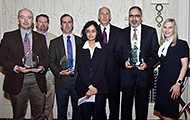
L to R: Michael Penev, NREL; Keith Wipke, NREL (accepting for Brian Bush); Marc Melaina, NREL; Sunita Satyapal, FCTO; Fred Joseck, FCTO; Amgad Elgowainy, ANL; Erika Sutherland, FCTO.
Systems Analysis
Marc Melaina, Brian Bush, and Michael Penev, National Renewable Energy Laboratory, and Amgad Elgowainy, Argonne National Laboratory
This award recognizes the team of Dr. Marc Melaina, Brian Bush, and Michael Penev, from the National Renewable Energy Laboratory, and Dr. Amgad Elgowainy of Argonne National Laboratory (ANL), for their outstanding achievements in the development of hydrogen station techno-economic and financial tools in support of DOE's efforts and H2USA. NREL developed a first-of-a-kind tool known as H2FAST (Hydrogen Financial Analysis Scenario Tool) that can be used to financially evaluate a single hydrogen fueling station or a network of stations. This online, user-friendly tool enables potential station investors or other interested parties to determine the economic viability of a station or multiple station investments, using a combination of default and/or custom (user-generated) inputs. ANL developed the Hydrogen Refueling Station Analysis Model (known as HRSAM), which allows users to analyze the techno-economic performance of different types of refueling stations and equipment, and develops accurate cost estimates based on current technology that can be used in the H2FAST tool. These two new models align to provide the community with powerful analysis tools needed to optimize the hydrogen infrastructure rollout.
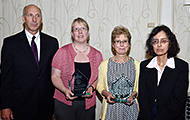
L to R: Fred Joseck, FCTO; Catherine Mertes, RCF Economic & Financial Consulting, Inc.; Marianne Mintz, ANL; Sunita Satyapal, FCTO.
Marianne Mintz, Argonne National Laboratory, and Catherine Mertes, RCF Economic & Financial Consulting, Inc.
This award recognizes Marianne Mintz of Argonne National Laboratory and Catherine Mertes of RCF Economic & Financial Consulting, Inc., for outstanding achievements in the development of analysis tools to assess the employment impacts of fuel cell and hydrogen infrastructure deployments. Marianne and Catherine led a team that developed the JOBS models for the U.S. Department of Energy's Fuel Cell Technologies Office (FCTO). The two models—JOBS and economic impacts of Hydrogen (JOBS H2) and JOBS and economic impacts of Fuel Cells (JOBS FC)—estimate employment, earnings, and economic output from the manufacture, installation, and use of hydrogen infrastructure and fuel cells. Both models have a flexible platform that permits users to analyze impacts at the state, regional, or national level and to examine scenarios in which different types and sizes of the relevant technology (PEM fuel cells, phosphoric acid fuel cells [PAFC], or molten-carbonate fuel cells [MCFC] in JOBS FC, or hydrogen fueling stations in JOBS H2) are produced inside or outside a region of interest. The models have also been used to assess the employment and economic impacts of the FCTO's American Recovery and Reinvestment Act projects and to support other FCTO analysis.
Technology Validation
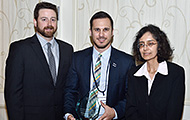
L to R: Jim Alkire, FCTO; Andrew Martinez, CARB (accepting for Michael Kashuba); Sunita Satyapal, FCTO.
Michael Kashuba, California Air Resources Board
This award recognizes Michael Kashuba of the California Air Resources Board for his outstanding contributions to hydrogen infrastructure advancements. Michael has been a major contributor to the planning and deployment of hydrogen fueling stations in California. His work has contributed to the first commercial sale of hydrogen, identification of gaps in current technology, and accumulation of lessons learned that will facilitate deployment of hydrogen infrastructure in the nation. Michael has been a leader in the process to certify dispensers for retail hydrogen sales and has been a key player in ensuring timely and effective coordination between the federal government and the state. Michael is also a contributor to the U.S. Department of Energy's Hydrogen Fueling Infrastructure Research and Station Technology (H2FIRST) project. He is actively involved in the H2FIRST task to develop and implement the Hydrogen Station Equipment Performance (or "HyStEP") device in California stations, which will help speed the acceptance of hydrogen stations by vehicle manufacturers.
